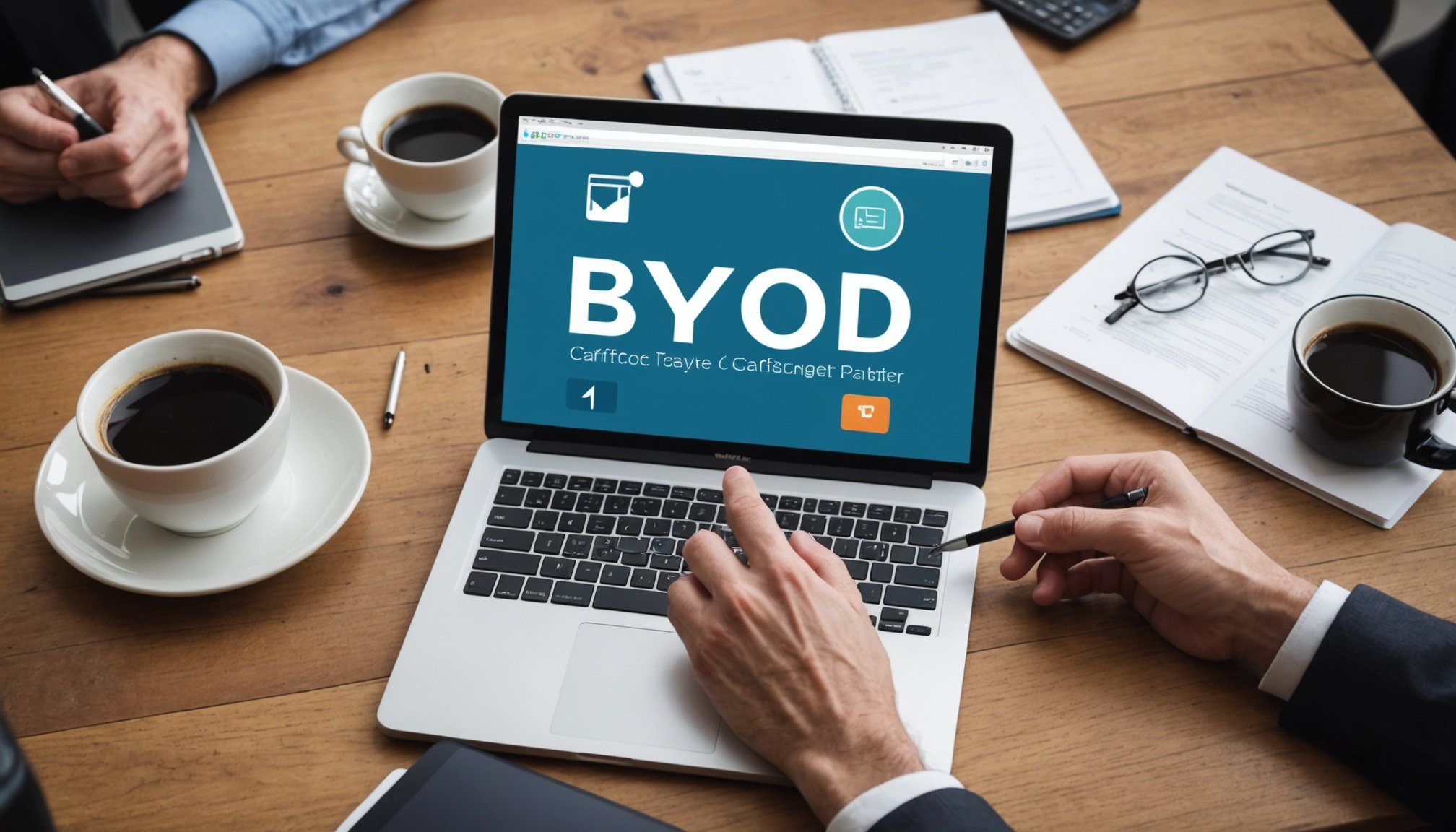Overview of BYOD Policies
In today’s fast-paced business world, BYOD policies have become increasingly important, especially for marketing agencies. BYOD, or Bring Your Own Device, policies allow employees to use their own devices for work purposes, offering flexibility and potentially increasing productivity.
Importance of BYOD Policies
A well-structured BYOD policy provides clear guidelines on acceptable device use while addressing potential security issues. This is crucial for maintaining the integrity of company data and ensuring legal compliance.
Also read : Elevating Remote Leadership: Key Strategies to Boost Success for UK E-Commerce Sales Teams
Benefits for Marketing Agencies
For marketing agencies, adopting a BYOD policy can lead to enhanced creativity and efficiency by enabling employees to work on familiar devices. This flexibility can lead to higher employee satisfaction and retention, crucial for agencies reliant on innovative outputs.
Key Components
Effective BYOD policies involve several key components:
In parallel : Transforming Workplace Wellbeing: Cutting-Edge Mental Health Programs for London Corporate Offices
- Device Security: Measures that protect data and minimize risks.
- Usage Guidelines: Clearly stated rules on how devices should be used for work.
- Compliance Requirements: Ensuring adherence to regulations such as data protection laws.
Marketing agencies must balance the advantages of BYOD with robust security measures to protect sensitive client information, demonstrating both technological savviness and careful planning in policy development.
Challenges Specific to Cardiff’s Marketing Agencies
In Cardiff, marketing agencies face unique challenges related to BYOD policies. The local regulatory environment is complex, necessitating careful navigation to avoid compliance pitfalls. Facilitating a balance between BYOD advantages and compliance is key for Cardiff-based agencies, as local regulations influence how these policies are structured.
Cardiff’s dynamic market adds another layer of complexity. Marketing agencies must address rapid technological changes while maintaining robust security measures. With innovative campaigns often involving sensitive data, ensuring cybersecurity becomes imperative. The inherent security risks in marketing practices—like data leaks during client interactions—highlight the necessity for policies that protect both agency and client information.
Agencies in Cardiff also deal with regional constraints, such as resource limitations that might affect their ability to implement comprehensive BYOD policies efficiently. However, understanding these specific challenges can guide agencies in devising strategies that not only comply with regulatory standards but also support operational goals.
Addressing these issues requires a collaborative approach, where marketing professionals, IT teams, and legal advisors work together to develop policies that are both flexible and secure, effectively managing risk while maintaining productivity.
Best Practices for Implementing BYOD Policies
Implementing BYOD policies effectively involves a strategic approach to mitigate risks and harness the benefits of increased flexibility. Understanding and following best practices is critical for successful implementation within marketing agencies.
Developing Policy Framework
Begin by crafting a comprehensive policy framework. This includes establishing guidelines for acceptable device use, security protocols, and compliance with data protection laws. The framework should clearly outline responsibilities for both the organization and employees. Involving key stakeholders, such as IT professionals and management, during the development phase ensures that all aspects are addressed.
Employee Training and Engagement
Employee engagement is vital. Conduct regular training sessions to educate staff on BYOD protocols and security measures. These sessions should cover potential threats, such as phishing attacks, and teach employees how to prevent data breaches. Engaging employees in the policy process increases compliance and empowers them to use their devices responsibly.
Technology Solutions for Compliance
Utilize technology to enhance compliance and manage devices. Tools like mobile device management (MDM) solutions can help monitor and control access to company data. Implementing encryption and multi-factor authentication further bolsters security, ensuring that sensitive information remains protected. Addressing employee concerns through technological means encourages adherence to policy guidelines and helps maintain a secure work environment.
Legal Considerations in BYOD Policies
Navigating legal issues within BYOD policies requires an understanding of compliance with regulations such as the General Data Protection Regulation (GDPR). Ensuring that data protection standards are met is crucial for marketing agencies, which often handle sensitive client information. It’s important to define ownership of data clearly. Employees should understand what data belongs to them and what remains the property of the agency.
To maintain compliance, agencies might consider implementing data encryption and ensuring secure storage solutions are in place. This not only protects data but also assures clients of the agency’s commitment to security.
Device regulations must also be considered, with guidelines in place for device use and maintenance to prevent unauthorized access to company data. Legal strategies should include drafting comprehensive agreements that outline responsibilities and liabilities regarding device use. These agreements serve to protect the agency from potential breaches and clarify expectations for employees.
Involving legal professionals during the development of BYOD policies ensures that all legal considerations are thoroughly addressed, reducing the risk of non-compliance and safeguarding against potential legal repercussions.
Impact of BYOD on Productivity and Security
Adopting a BYOD policy in marketing agencies can significantly influence both productivity and security, creating a dynamic yet challenging environment. This dual impact benefits agencies, promoting adaptability and responsiveness in the workforce.
Flexibility and employee satisfaction thrive under BYOD policies, as employees use familiar devices, streamlining their workflow and enhancing job satisfaction. This often leads to increased productivity, as employees can work seamlessly whether in the office, at home, or on the go, thus ensuring continuity in creative projects and client services.
However, adopting BYOD comes with its share of security vulnerabilities. Personal devices might not comply fully with company security protocols, increasing the risk of data breaches and cyber threats. Ensuring robust security measures, like encryption and access control, is crucial to counteract these risks while maintaining the benefits of a flexible environment.
Balancing productivity gains with effective risk management is essential. Implementing stringent security policies and training employees on security best practices can mitigate risks associated with BYOD in marketing agencies. This balance not only safeguards sensitive information but also sustains a high-performance culture amidst evolving technological landscapes.
Case Studies from Cardiff Marketing Agencies
Examining real-world examples of BYOD policy implementations sheds light on the practices of successful marketing agencies in Cardiff. These case studies offer actionable insights, detailing both triumphs and challenges experienced by local agencies.
Successful BYOD Implementation
Cardiff-based agency Creative Surge exemplifies a successful BYOD implementation. By tailoring their policy to meet both employee preferences and security requirements, they enhanced productivity by 20%. Embracing flexibility, they crafted robust guidelines for device usage and security, which were crucial to their success.
Lessons Learned from Challenges
Other agencies faced hurdles, such as data breach incidents due to inadequate security protocols. Learning from these challenges, digital agency VisionCraft bolstered its BYOD framework by incorporating stronger encryption and mandatory security training sessions. This adjustment significantly reduced security risks while ensuring compliance with local regulations.
Testimonials from Agency Leaders
Leaders in the field stress the importance of understanding unique industry demands. According to Leo Evans, CEO of AdNext, “Adopting a BYOD policy allowed for substantial growth in employee satisfaction, but we quickly learned that consistent updates to our security measures were non-negotiable.” Such testimonials highlight the critical balance between flexibility and security in maximizing agency performance.











